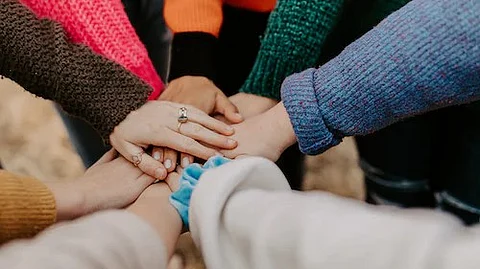
- Home
- NewsGram USA
- India
- न्यूजग्राम
- World
- Politics
- Entertainment
- Culture
- Lifestyle
- Economy
- Sports
- Sp. Coverage
- Misc.
- NewsGram Exclusive
- Jobs / Internships

Here's what it means:
The four judgments were written by CJI DY Chandrachud, Justice SK Kaul, Justice Ravindra Bhat, and Justice PS Narasimha respectively.
Out of the five judges on the Constitution Bench, the majority verdicts delivered by three judges, Justice Ravindra Bhat, Justice Hima Kohli, and Justice PS Narasimha held that civil unions between same-sex couples are not recognised under law and they cannot claim the right to adopt children either.
In two separate minority judgments, CJI DY Chandrachud and Justice Kaul ruled that same-sex couples are entitled to recognise their relationships as civil unions and can claim consequential benefits.
Both the judges held that such couples have the right to adopt children and struck down Central Adoption Resource Authority (CARA) regulations to enable the same.
However, Justice Bhat maintained that CARA regulations were in fact not void for not allowing queer couples to adopt. Justice Kohli concurred with Justice Bhat. Justice Narasimha agreed with Justice Bhat's view and stated that CARA Regulations could not be held unconstitutional.
What are the CARA regulations on adoption?
Under the eligibility criteria for prospective adoptive parents, the CARA regulations say: 1) The prospective adoptive parents shall be physically, mentally and emotionally stable, financially capable and shall not have any life-threatening medical condition.
2) Any prospective adoptive parents, irrespective of marital status and whether or not s/he has biological son or daughter, can adopt a child subject to following, namely:- (a) the consent of both the spouses for the adoption shall be required, in case of a married couple; (b) a single female can adopt a child of any gender; (c) a single male shall not be eligible to adopt a girl child; 3) No child shall be given in adoption to a couple unless they have at least two years of stable marital relationship.
Why minority judgments from CJI and Justice Kaul struck down the CARA?
The CJI observed that the Juvenile Justice (JJ) Act does not preclude unmarried couples from adopting. He further said that the Centre has not proved that precluding unmarried couples from adopting is in the best interest of the child. Thus, CARA has exceeded its authority in not allowing unmarried couples to adopt.
The CJI emphasised that the objective of CARA is to ensure the best interest of the child. And differentiating between married couples and unmarried couples has no reasonable connection with that.
He further noted that there is no material on record to prove that only a married heterosexual couple can provide stability to a child. And law cannot assume that only heterosexual couples can be good parents.
The CJI held that the CARA regulation 5 (3), which excludes queer couples from adoption is violative of Article 15 of the Constitution that forbids discrimination on grounds only of religion, race, caste, gender, or place of birth.
What does the majority judgment say about CARA?
Justice Bhat disagreed with the CJI and stated that Regulation 5(3) of CARA could not be held unconstitutional. Justice Hima Kohli concurred with Justice Bhat. However, he also stated that this does not mean to say that unmarried or non-heterosexual couples can't be good parents. " ...given the objective of Section 57, the State as parens patriae has to explore all areas and to ensure all benefits reach the children at large in need of stable homes," he said.
Justice PS Narasimha, agreeing with Justice Bhat, stated that CARA regulations could not be held unconstitutional.
Can same-sex couples adopt after this judgment?
No, since the Bench was divided and the majority judgment (3:2) held that couples cannot adopt under the prevalent law and upheld CARA, the status quo will prevail. IANS/KB
